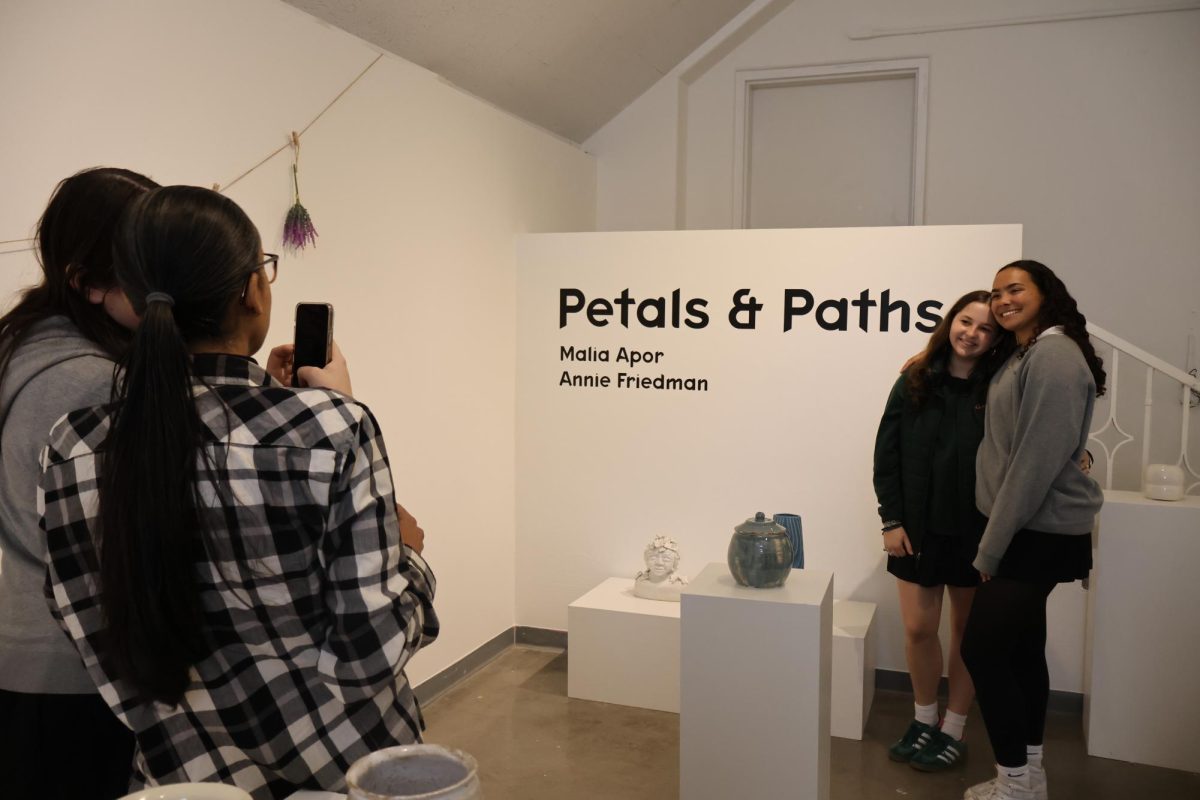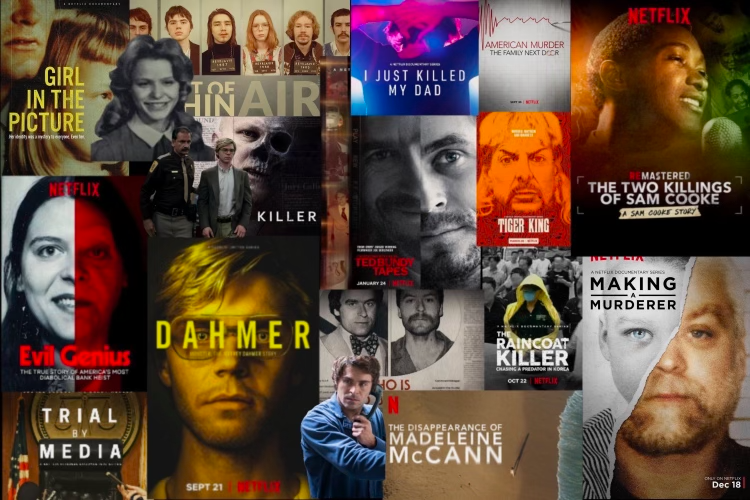Op-Ed: Consumers’ obsession with true crime is problematic, insensitive
Photo credit: Sara Guggenheim
This collage features promotional images from various Netflix true crime documentaries. With the recent release of “Monster: The Jeffrey Dahmer Story,” I’ve thought a lot about our society’s consumption of true crime television, podcasts and videos.
October 17, 2022
If you have access to Netflix, Hulu or any other streaming service, chances are you’ve noticed the influx of true crime documentaries. These films are released almost weekly, and YouTubers and podcast creators have taken artistic liberties with their narration of events. We have become desensitized to the nature of true crime.
True crime can be described as the nonfiction literary, film and media genre in which the producer examines the details surrounding fact-based crimes. Most of the true-crime media we consume explore solved cases. “Conversations with a Serial Killer: The John Wayne Gacy Tapes,” “Conversations with a Serial Killer: The Jeffrey Dahmer Tapes” and the recent “Monster: The Jeffrey Dahmer Story” have all made it onto Netflix’s Top Ten most watched list for television.
True crime has become a sensation and the dreadful reasoning behind this morbid obsession comes from the need to rationalize our fears. In an article published by NBC News, clinical psychotherapist Kathleen Check commented on the notion that viewing true crime media allows viewers to get inside the mind of a murderer.
“Tuning in and following the specifics of a crime also creates a [false] sense of being able to ‘see inside’ the mind of a criminal, thus creating a psychological protective barrier: ‘If I know how criminals operate, I can protect myself,” Check said.
For the same reasons people are intrigued by gruesome horror movies and villains such as Freddie Kreuger and Michael Myers, engaging with true crime media allows us to experience a world in which the monsters we view on the screen are real.
An article written by Illinois News Bureau drew upon data that women were more likely to engage with true crime media as opposed to men — a fact that isn’t entirely surprising. As women tend to be the primary victims of serial killers such as Ted Bundy or infamous one-off crimes, they view these documentaries as a means of protection and fascination, understanding the very dark reality that they could fall victim to similar crimes.
The obsession with true crime has progressed beyond documentaries and influenced pop culture media. Several female influencers have made a name for themselves in the “true crime,” community. Popular influencer Bailey Sarian explores infamous homicides and strange disappearances all while creating extravagant makeup looks in her successful Youtube series “Murder, Mystery and Makeup Mondays.” And, Stephanie Soo, an established content creator films herself consuming large amounts of delicious food and diving into the most obscure murders.
While the reasons behind why we are enamored with true crime are understandable, it doesn’t make this fixation with this form of media justifiable. We have become too familiar with hearing the gruesome details of crimes that have affected real people. But this isn’t the fault of the consumer alone; the producers of this media continuously create content that glorifies crimes as opposed to documenting them. With each makeup tutorial and mukbang, we’ve distanced ourselves from the people involved and lessened the significance of these crimes.
The recent release of “Monster: The Jeffrey Dahmer Story,” has sparked fierce debates and discourse on various social media platforms surrounding the production and problematic aspects of the limited series. The show portrays Dahmer’s serial killings and cannibalism and has an authenticity that some find disturbing. The producers neglected their responsibilities of consulting the surviving families of Dahmer’s victims. Rita Isabelle is a prime example of this.
In an essay written for Insider, Isabelle, a family member of one of Dahmer’s victims, said it was uncomfortable reliving the trauma she experienced while watching the first episode of the series.
“When I saw some of the show, it bothered me, especially when I saw myself — when I saw my name across the screen and this lady saying verbatim exactly what I said,” Isabelle said. “If I didn’t know any better, I would’ve thought it was me. [The actress’s] hair was like mine, she had on the same clothes. That’s why it felt like reliving it all over again. It brought back all the emotions I was feeling back then.”
As someone who watched true crime series nonstop during quarantine, the consumption of this media put me in a depressive state. It was all I watched. I went to sleep watching different YouTube videos and listened to podcasts on my morning walks. I’m here to tell you now, that’s no way to live life — engrossed in the death of innocent people.
We’ll skip episodes of shows and podcasts if they’re “uninteresting” and base our enjoyment watching on the extremity and brutality of the crime. We’ve begun to treat these documentaries as entertainment, reviewing the contents of crimes with friends and family, similar to the events of a football game or the latest reality show.
We’ve shown blithe regard for the victims of these crimes and their families. Video after video, we forget the people on our screens were real, their trauma was real and their pain was real.
I urge you to consider what impact consuming this form of “entertainment” will have on your mental health and the families of victims. And, if murder and mysteries pique your curiosity, I advise engaging with fictitious series such as “Criminal Minds,” “Law & Order” or a number of other detective shows and films.




![Freshman Milan Earl and sophomore Lucy Kaplan sit with their grandparents at Archer’s annual Grandparents and Special Friends Day Friday, March 15. The event took place over three 75-minute sessions. “[I hope my grandparents] gain an understanding about what I do, Kaplan said, because I know they ask a lot of questions and can sort of see what I do in school and what the experience is like to be here.](https://archeroracle.org/wp-content/uploads/2024/03/grandparents-day-option-2-1200x800.jpg)




























































